Unit2 I think that mooncakes are delicious! (Section A 3a-3c) 2023-2024学年课件(30张PPT)
文档属性
| 名称 | Unit2 I think that mooncakes are delicious! (Section A 3a-3c) 2023-2024学年课件(30张PPT) | 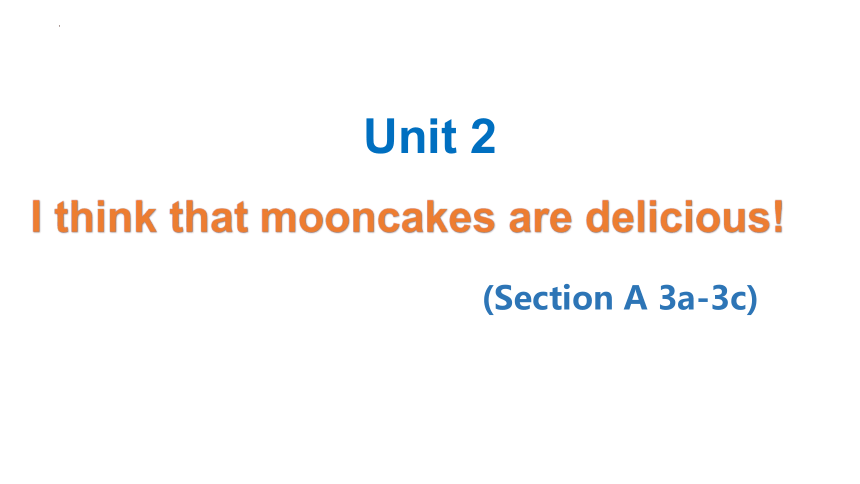 | |
| 格式 | pptx | ||
| 文件大小 | 1.7MB | ||
| 资源类型 | 教案 | ||
| 版本资源 | 人教新目标(Go for it)版 | ||
| 科目 | 英语 | ||
| 更新时间 | 2023-09-15 12:49:28 | ||
图片预览

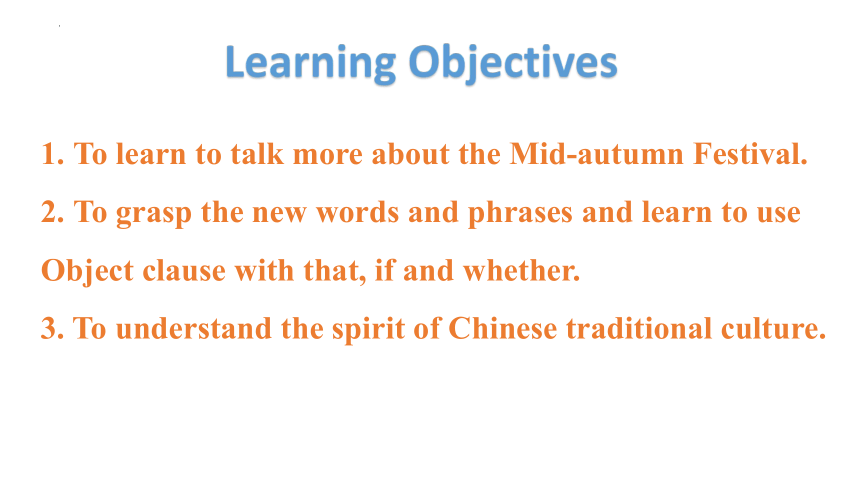
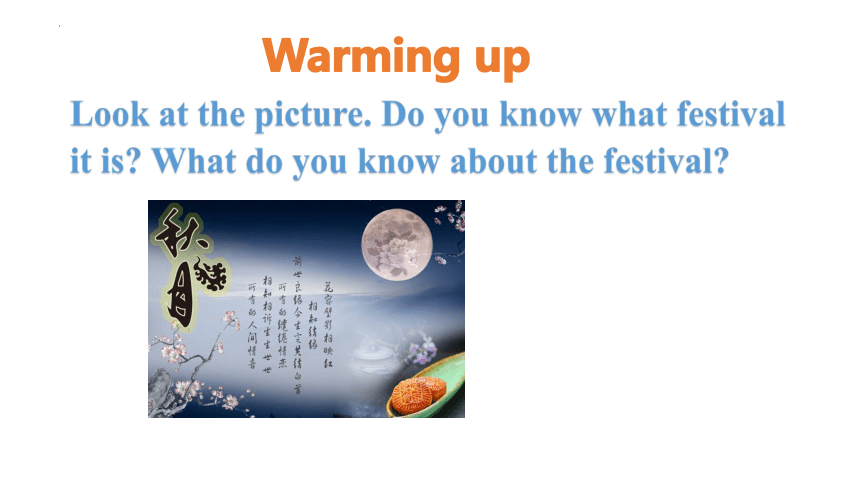
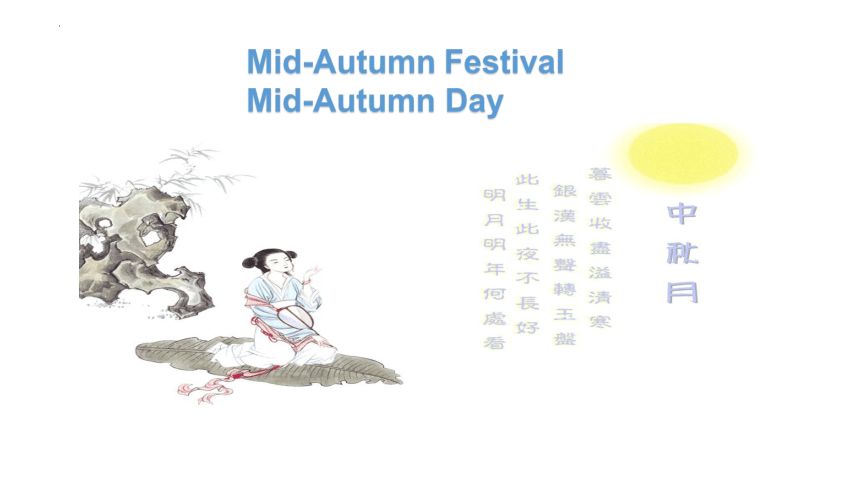
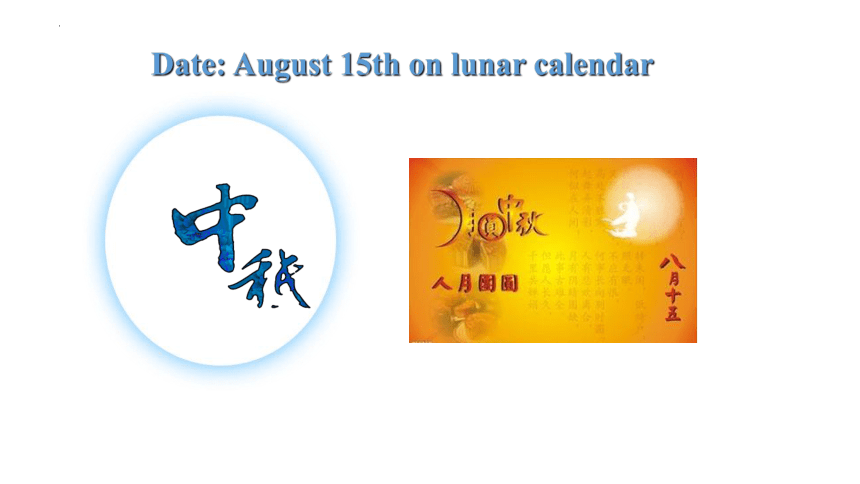
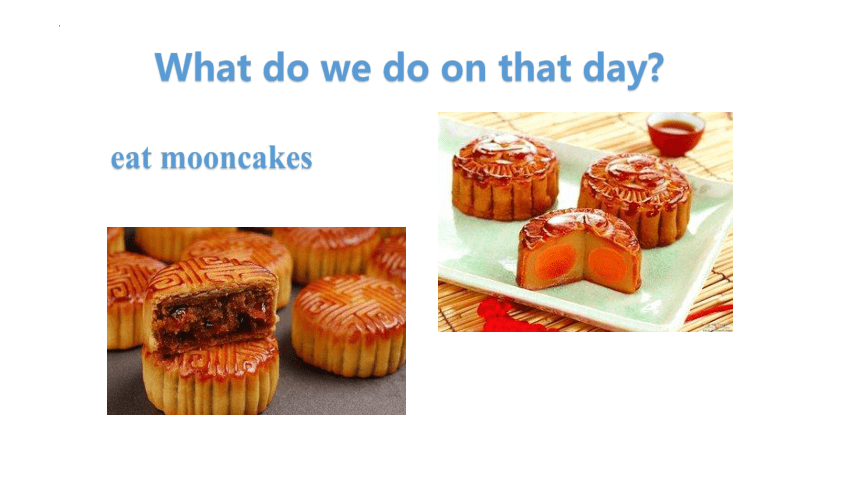
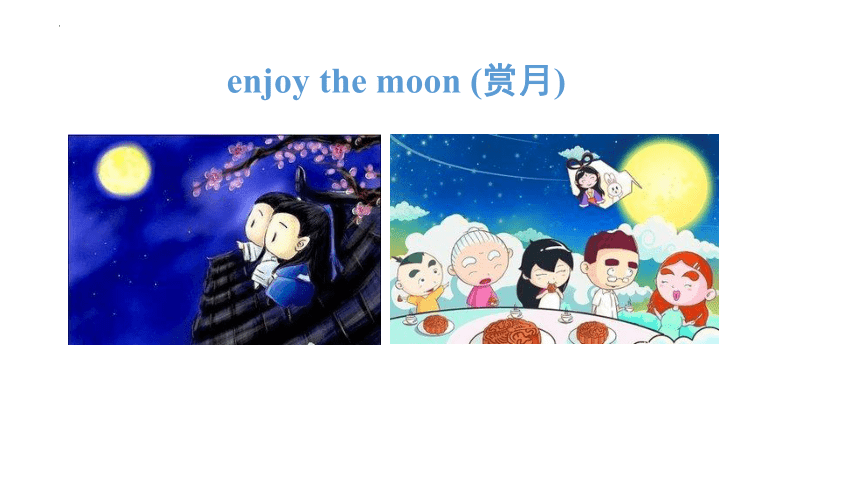
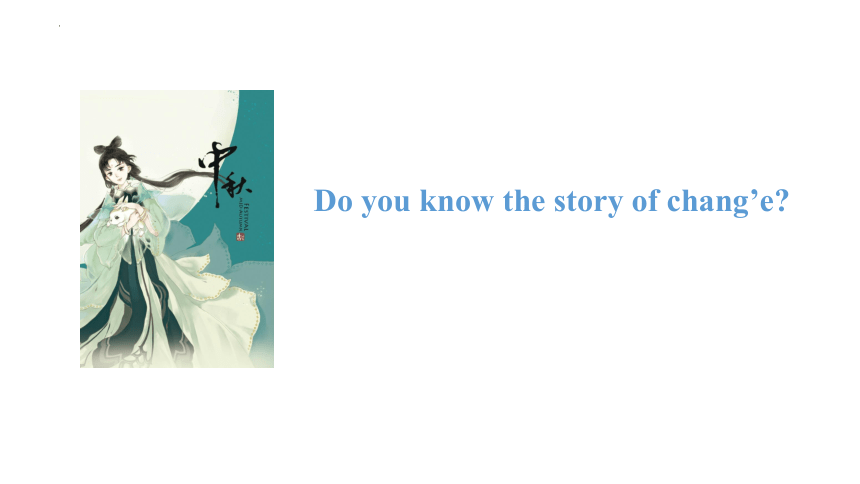
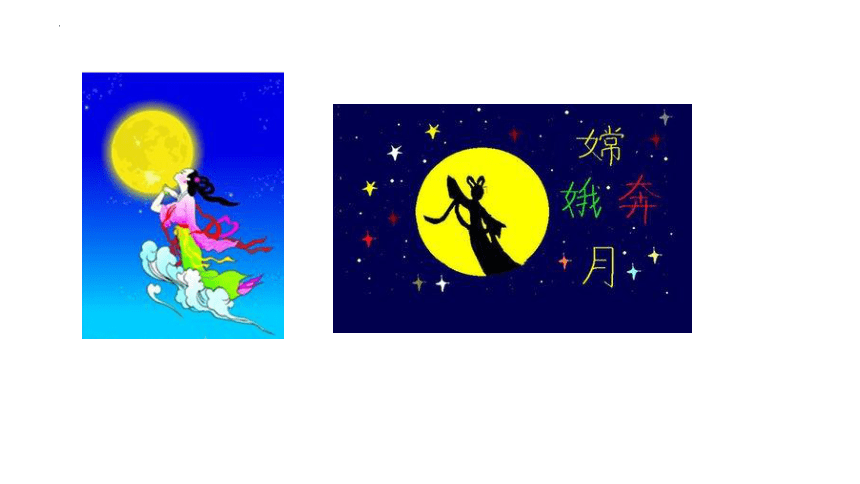
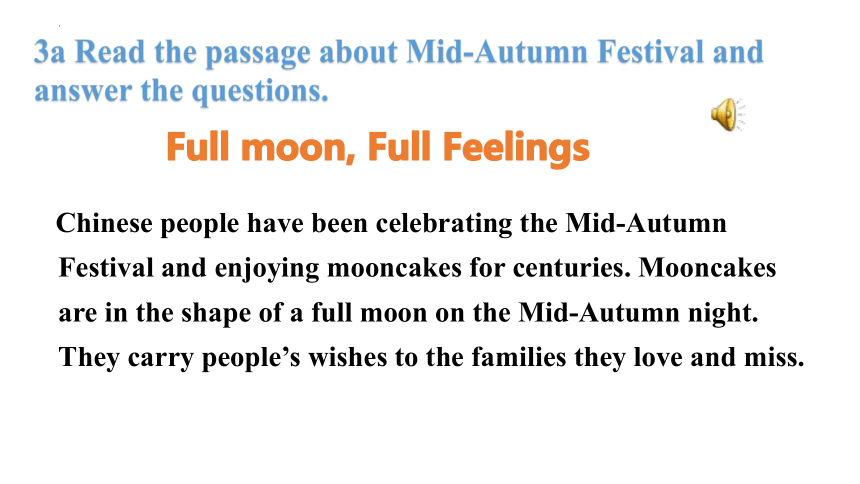
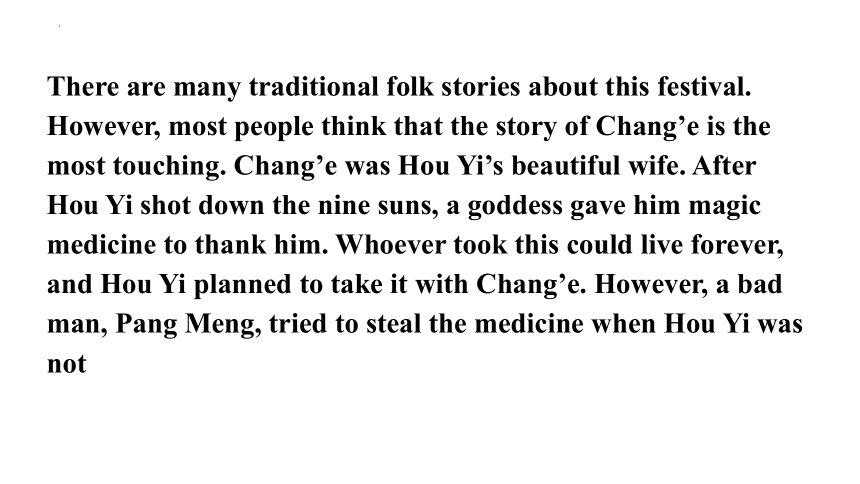
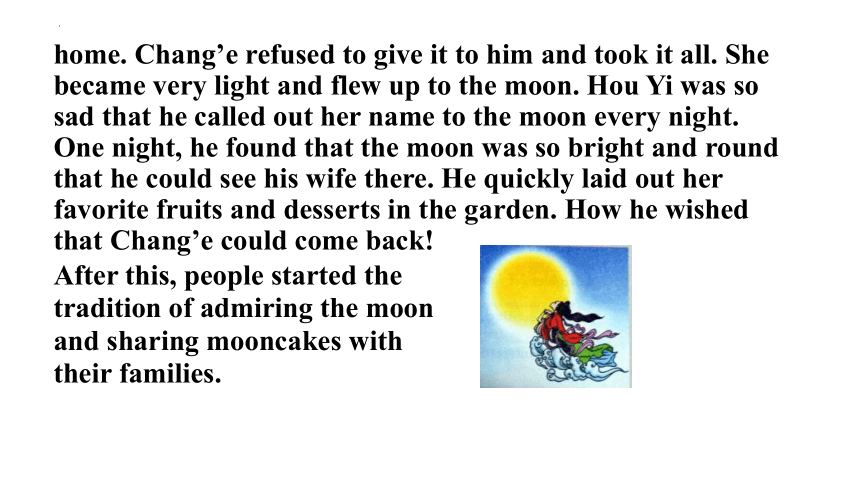
文档简介
(共30张PPT)
Unit 2
I think that mooncakes are delicious!
(Section A 3a-3c)
1. To learn to talk more about the Mid-autumn Festival.
2. To grasp the new words and phrases and learn to use Object clause with that, if and whether.
3. To understand the spirit of Chinese traditional culture.
Learning Objectives
Warming up
Look at the picture. Do you know what festival
it is What do you know about the festival
Mid-Autumn Festival
Mid-Autumn Day
Date: August 15th on lunar calendar
What do we do on that day
eat mooncakes
enjoy the moon (赏月)
Do you know the story of chang’e
3a Read the passage about Mid-Autumn Festival and answer the questions.
Chinese people have been celebrating the Mid-Autumn Festival and enjoying mooncakes for centuries. Mooncakes are in the shape of a full moon on the Mid-Autumn night. They carry people’s wishes to the families they love and miss.
Full moon, Full Feelings
There are many traditional folk stories about this festival. However, most people think that the story of Chang’e is the most touching. Chang’e was Hou Yi’s beautiful wife. After Hou Yi shot down the nine suns, a goddess gave him magic medicine to thank him. Whoever took this could live forever, and Hou Yi planned to take it with Chang’e. However, a bad man, Pang Meng, tried to steal the medicine when Hou Yi was not
home. Chang’e refused to give it to him and took it all. She became very light and flew up to the moon. Hou Yi was so sad that he called out her name to the moon every night. One night, he found that the moon was so bright and round that he could see his wife there. He quickly laid out her favorite fruits and desserts in the garden. How he wished that Chang’e could come back!
After this, people started the
tradition of admiring the moon
and sharing mooncakes with
their families.
By admiring the moon and sharing mooncakes with their families.
How do people celebrate the Mid-Autumn Festival
2. What story is the reading about
The story of Chang’e.
Answer the questions.
admire v. 欣赏,仰慕
3b Read the passage again. Put the events in the correct order.
______ Pang Meng tried to steal the medicine.
______ A goddess thanked Hou Yi by giving
him magic medicine.
______ Chang’e refused to give Pang Meng
the medicine and took it all.
______ Hou Yi shot down the nine suns and
saved the people on the earth.
4
2
5
1
n. 女神
v. 偷
______ Hou Yi was very sad and watched the
moon at night, and wished his wife
could come back.
______ As a result, Chang’e became light and
flew up to the sky.
______ Hou Yi planned to take the medicine
with his wife.
7
6
3
Language points
They carry people’s wishes to the families they love and miss.月饼寄托着人们对他们所爱与思念的家人的祝福。
(1) wish此处用作名词,意为“祝福;愿望”。
Send you my best wishes.
送给你我最美好的祝愿。
My wish is to become a doctor.
我的愿望是当一名医生。
Language points
wish还可用作动词,意为“希望;想要”,后接名词、代词或动词不定式作宾语。
Do you wish a pen or a book
你想要的是钢笔还是书?
I wish you success.
我祝你成功。
We wish to see the film.
我们希望看那部电影。
Language points
wish to do sth. 希望做某事
wish+ that从句 希望……(不易实现的愿望)
wish sb. to do sth. 希望某人做某事
wish sb.+n. 希望某人……
hope to do sth. 希望做某事
hope+ that从句 希望……(易实现的愿望)
辨析 wish 与 hope
We wish you a happy new year!
我们祝你新年快乐!
Language points
(2) miss动词,意为“思念, 想念”。
I’m sure that everybody will miss him.
我相信每个人都会想念他的。
miss作动词,还可表示“错过”,后接名词、代词或动词-ing形式作宾语。
Don’t miss our bargain offer!
本店大减价,勿失良机!
I missed taking part in the sports meeting.
我错过了参加这次运动会的机会。
Language points
2. Whoever took this could live forever, and Hou Yi planned to take it with Chang’e.
无论谁喝了此药都能长生不老。后羿打算和嫦娥一起服用。
whoever作代词,意为“无论谁;不管什么人”,相当于no matter who, 可引导让步状语从句或名词性从句。此处whoever引导名词性从句,作主语,表达让步之意。
Whoever did it, I didn’t.
不管这事是谁干的,反正不是我干的。
3. … tried to steal the medicine when Hou Yi was not home …
……试图趁后羿不在家时偷仙药。
steal动词,意为“偷;窃取”。其过去式、过去分词分别为stole, stolen。
She used to steal money from her father’s drawer.
他过去常从父亲的抽屉里偷钱。
It’s wrong to steal. 偷窃是不对的。
Language points
4. Hou Yi was so sad that he called out her name to the moon every night.
后羿伤心不已,对月呼喊她的名字。
( l ) so … that ...意为“如此……以至于”,引导结果状语从句,so后接形容词或副词,常用以下结构:
Language points
① so+形容词/副词+that从句;
② so+形容词+a/an+单数可数名词+that 从句;
③ so + many/few +复数可数名词+ that从句;
④ so + much/little +不可数名词+ that 从句。
Language points
It was so hot that we all went for a swim.
天气太热了,所以我们都去游泳了。
He had so many books to read that he had no time to watch TV.
他有这么多书要读以至于没有时间看电视了。
(2) call out one’s name 意为“大声呼喊某人的名字”。
I called out her name but she turned a deaf ear to my calling.
我大声叫她,但她不理我。
6. After this, people started the tradition of admiring the moon and sharing mooncakes with their families.
此后, 人们便开始了同家人一起赏月品月饼的传统。
(1) tradition名词,意为“传统”。其形容词形式是 traditional (传统的)。the tradition of ...意为“……的传统”。
It is simply a village tradition.
它仅仅是一个村庄的传统。
(2) admire 动词,意为“欣赏;仰慕”。常用结构:
admire sb./sth. “欣赏某人/某物”
admire sb. for sth. “为某事而欣赏某人;因某事而佩服某人”
We admired him very much.
我们很欣赏他。
I admire her for her bravery.
我很钦佩她的勇气。
3c Without looking at the passage, try to complete the sentences with the correct words.
People like to a_____ the full moon on the Mid-Autumn night.
2. The story of Chang’e is one of many t___________ folk stories.
3. Hou Yi got m___________ medicine for shooting down the nine suns.
4. Peng Meng wanted to s____ the medicine.
5. Hou Yi l____ out fruits and desserts in the garden.
dmire
raditional
agic
teal
aid
Translation
1. After this, people started ______________
______________________________________________________________. (赏月的传统并和家人一起分享月饼)
the tradition of
admiring the moon and sharing mooncakes with
their families
They carry people’s wishes to the families they love and miss.
2. 月饼将人们的祝福带给他们所爱和想念的家人那里。
Homework
Discuss with your partner about your
favorite festivals and give reasons.
Thank you!
Unit 2
I think that mooncakes are delicious!
(Section A 3a-3c)
1. To learn to talk more about the Mid-autumn Festival.
2. To grasp the new words and phrases and learn to use Object clause with that, if and whether.
3. To understand the spirit of Chinese traditional culture.
Learning Objectives
Warming up
Look at the picture. Do you know what festival
it is What do you know about the festival
Mid-Autumn Festival
Mid-Autumn Day
Date: August 15th on lunar calendar
What do we do on that day
eat mooncakes
enjoy the moon (赏月)
Do you know the story of chang’e
3a Read the passage about Mid-Autumn Festival and answer the questions.
Chinese people have been celebrating the Mid-Autumn Festival and enjoying mooncakes for centuries. Mooncakes are in the shape of a full moon on the Mid-Autumn night. They carry people’s wishes to the families they love and miss.
Full moon, Full Feelings
There are many traditional folk stories about this festival. However, most people think that the story of Chang’e is the most touching. Chang’e was Hou Yi’s beautiful wife. After Hou Yi shot down the nine suns, a goddess gave him magic medicine to thank him. Whoever took this could live forever, and Hou Yi planned to take it with Chang’e. However, a bad man, Pang Meng, tried to steal the medicine when Hou Yi was not
home. Chang’e refused to give it to him and took it all. She became very light and flew up to the moon. Hou Yi was so sad that he called out her name to the moon every night. One night, he found that the moon was so bright and round that he could see his wife there. He quickly laid out her favorite fruits and desserts in the garden. How he wished that Chang’e could come back!
After this, people started the
tradition of admiring the moon
and sharing mooncakes with
their families.
By admiring the moon and sharing mooncakes with their families.
How do people celebrate the Mid-Autumn Festival
2. What story is the reading about
The story of Chang’e.
Answer the questions.
admire v. 欣赏,仰慕
3b Read the passage again. Put the events in the correct order.
______ Pang Meng tried to steal the medicine.
______ A goddess thanked Hou Yi by giving
him magic medicine.
______ Chang’e refused to give Pang Meng
the medicine and took it all.
______ Hou Yi shot down the nine suns and
saved the people on the earth.
4
2
5
1
n. 女神
v. 偷
______ Hou Yi was very sad and watched the
moon at night, and wished his wife
could come back.
______ As a result, Chang’e became light and
flew up to the sky.
______ Hou Yi planned to take the medicine
with his wife.
7
6
3
Language points
They carry people’s wishes to the families they love and miss.月饼寄托着人们对他们所爱与思念的家人的祝福。
(1) wish此处用作名词,意为“祝福;愿望”。
Send you my best wishes.
送给你我最美好的祝愿。
My wish is to become a doctor.
我的愿望是当一名医生。
Language points
wish还可用作动词,意为“希望;想要”,后接名词、代词或动词不定式作宾语。
Do you wish a pen or a book
你想要的是钢笔还是书?
I wish you success.
我祝你成功。
We wish to see the film.
我们希望看那部电影。
Language points
wish to do sth. 希望做某事
wish+ that从句 希望……(不易实现的愿望)
wish sb. to do sth. 希望某人做某事
wish sb.+n. 希望某人……
hope to do sth. 希望做某事
hope+ that从句 希望……(易实现的愿望)
辨析 wish 与 hope
We wish you a happy new year!
我们祝你新年快乐!
Language points
(2) miss动词,意为“思念, 想念”。
I’m sure that everybody will miss him.
我相信每个人都会想念他的。
miss作动词,还可表示“错过”,后接名词、代词或动词-ing形式作宾语。
Don’t miss our bargain offer!
本店大减价,勿失良机!
I missed taking part in the sports meeting.
我错过了参加这次运动会的机会。
Language points
2. Whoever took this could live forever, and Hou Yi planned to take it with Chang’e.
无论谁喝了此药都能长生不老。后羿打算和嫦娥一起服用。
whoever作代词,意为“无论谁;不管什么人”,相当于no matter who, 可引导让步状语从句或名词性从句。此处whoever引导名词性从句,作主语,表达让步之意。
Whoever did it, I didn’t.
不管这事是谁干的,反正不是我干的。
3. … tried to steal the medicine when Hou Yi was not home …
……试图趁后羿不在家时偷仙药。
steal动词,意为“偷;窃取”。其过去式、过去分词分别为stole, stolen。
She used to steal money from her father’s drawer.
他过去常从父亲的抽屉里偷钱。
It’s wrong to steal. 偷窃是不对的。
Language points
4. Hou Yi was so sad that he called out her name to the moon every night.
后羿伤心不已,对月呼喊她的名字。
( l ) so … that ...意为“如此……以至于”,引导结果状语从句,so后接形容词或副词,常用以下结构:
Language points
① so+形容词/副词+that从句;
② so+形容词+a/an+单数可数名词+that 从句;
③ so + many/few +复数可数名词+ that从句;
④ so + much/little +不可数名词+ that 从句。
Language points
It was so hot that we all went for a swim.
天气太热了,所以我们都去游泳了。
He had so many books to read that he had no time to watch TV.
他有这么多书要读以至于没有时间看电视了。
(2) call out one’s name 意为“大声呼喊某人的名字”。
I called out her name but she turned a deaf ear to my calling.
我大声叫她,但她不理我。
6. After this, people started the tradition of admiring the moon and sharing mooncakes with their families.
此后, 人们便开始了同家人一起赏月品月饼的传统。
(1) tradition名词,意为“传统”。其形容词形式是 traditional (传统的)。the tradition of ...意为“……的传统”。
It is simply a village tradition.
它仅仅是一个村庄的传统。
(2) admire 动词,意为“欣赏;仰慕”。常用结构:
admire sb./sth. “欣赏某人/某物”
admire sb. for sth. “为某事而欣赏某人;因某事而佩服某人”
We admired him very much.
我们很欣赏他。
I admire her for her bravery.
我很钦佩她的勇气。
3c Without looking at the passage, try to complete the sentences with the correct words.
People like to a_____ the full moon on the Mid-Autumn night.
2. The story of Chang’e is one of many t___________ folk stories.
3. Hou Yi got m___________ medicine for shooting down the nine suns.
4. Peng Meng wanted to s____ the medicine.
5. Hou Yi l____ out fruits and desserts in the garden.
dmire
raditional
agic
teal
aid
Translation
1. After this, people started ______________
______________________________________________________________. (赏月的传统并和家人一起分享月饼)
the tradition of
admiring the moon and sharing mooncakes with
their families
They carry people’s wishes to the families they love and miss.
2. 月饼将人们的祝福带给他们所爱和想念的家人那里。
Homework
Discuss with your partner about your
favorite festivals and give reasons.
Thank you!
同课章节目录
- Unit 1 Where did you go on vacation?
- Section A
- Section B
- Unit 2 How often do you exercise?
- Section A
- Section B
- Unit 3 I'm more outgoing than my sister.
- Section A
- Section B
- Unit 4 What's the best movie theater?
- Section A
- Section B
- Unit 5 Do you want to watch a game show?
- Section A
- Section B
- Unit 6 I'm going to study computer science.
- Section A
- Section B
- Unit 7 Will people have robots?
- Section A
- Section B
- Unit 8 How do you make a banana milk shake?
- Section A
- Section B
- Unit 9 Can you come to my party?
- Section A
- Section B
- Unit 10 If you go to the party, you'll have a grea
- Section A
- Section B
